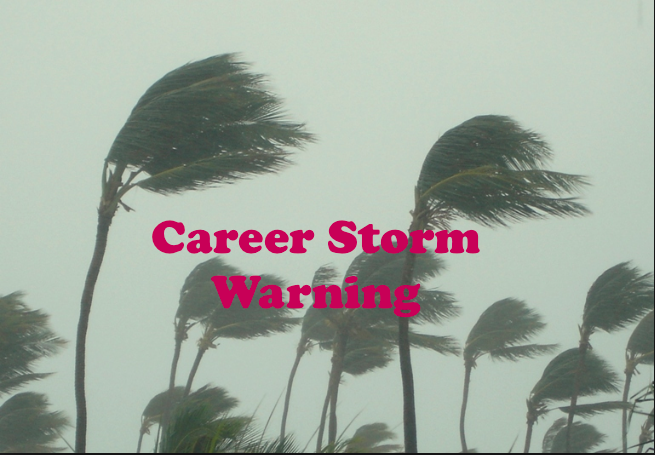
24 Sep Storm Watch
A number of years back – as my company braced for a coming downsizing – I joined a large group of fellow employees for a major meeting. Not surprisingly, the topic that dominated every side conversation that week had little to do with the task at hand – and everything to do with the possibility of job loss.
Fear permeated the meeting. It drifted through the hallways. It soaked into the walls. It flashed across the big screen as presentations were made. It was everywhere.
I learned something that day – as my mind drifted while a spokesperson droned on about a strategy that I have long since forgotten.
And I never forgot the lesson.
A great many victims were attending that meeting – and I was one of them. Each of us was terrified about our prospects for the future – and yet strangely unable to do anything about it – more than fret.
The strange part – this wasn’t our first rodeo. By that point a majority of us had gone through multiple downsizings – and yet we were totally unprepared for the next storm.
Our recourse – “well, maybe it will work out….let’s just wait and see.” Like the citizens of a coastal town that’s endured multiple hurricane hits but refuses to ever believe it could happen again. Instead they gather on the beach and gaze at the skies, wring their hands, and wonder.
That downsizing did come – and many of the people I saw at that meeting were affected. But it was only after the job slipped away that they took action.
After the storm.
This is what they did when the winds died down – they worked with an outside agency, they got their resume together, they started prospecting, they started interviewing and for most – over the next year – they finally regained employment.
Said another way – they rebuilt. And I’ll bet at least some immediately went back to their “I’ll just ignore the hurricane” strategy.
I’ll get a job – I’ll go to work – I’ll work hard – I’ll expect the company to take care of me. And I will not let myself think there could ever, ever, ever be another storm.
I have a name for this “affliction.” It’s called SCB and that stands for Severe Career Blindness. If you looked for it in a reputable medical journal you probably wouldn’t find it – but it just as real as diabetes, hypertension, or toe fungus.
It’s a treatable malady but it requires a severe intervention. The intervention steps include:
- Get agreement a problem exists – hurricanes are a potential part of every career and every industry. The employee who assumes a career long partnership with his or her firm is commendable – and likely delusional. The average job lasts approximately four years. There will be few who invest even ten years with one company.
- Embrace the reality of Free Agency. In my book, The Compass Solution: A Guide to Winning Your Career, we talk about the Free Agent Four in some detail. You are not under a lifetime contract. I know, you want it to be – we ALL want it to be. It’s not – get over it.
- Keep your job options open – and that means remaining constantly mindful of your local market and opportunities. Three things you MUST do:
- Keep your resume updated – at a minimum of once per quarter. And yes, the “I haven’t done a resume in years” excuse is the ultimate symptom of advanced stage SCB.
- Know and maintain a contact with at least one local recruiter – at minimum.
- Build a network of workers in the same workspace and/or in your field. Best source for a new job.
- Plan as if your job will end in six months. I know, it sounds harsh but if you plan for disaster you are prepared for disaster. If you stumble along in a blind haze you will react with that same level of awareness.
Four simple steps – but powerful ones that put you more in control.
Remember, you either lead your career or your career is going to lead you.
That meeting from all those years ago offered me a lesson I was never to forget. Those employees who wander along – frightened and hoping – had effectively “given up” – hoping the company would always be there to protect them.
It was then that I decided to protect myself.
The larger reality – every person in that room had the same ability I had to take action – but it was only when many of them HAD to that they did.
After the storm had passed.
Severe Career Blindness is treatable – but it requires direction and a sense of purpose that many don’t have.
In retrospect, I believe The Compass Solution: A Guide to Winning Your Career started to be written that day – the first efforts of a long-term survivor intent on building shelter from the storm.


Sorry, the comment form is closed at this time.